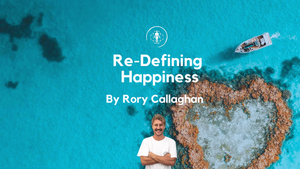Let's dive into a brief summary of Chapter 4, shall we? Grab a cup of your favorite beverage, get comfortable, and let's explore a question that's both simple and profound: Are you happy?
Chapter 4: Are You Happy?
Happiness. It's what we're all chasing, right? But here's the thing: we often confuse happiness with pleasure. And that confusion? It's costing us our wellbeing.
Let's start with a bold statement: True happiness isn't about feeling good all the time. Shocking, I know. But stick with me here.
In our modern world, we're bombarded with messages telling us that happiness is just a purchase, a achievement, or a Netflix binge away. But as psychologist Robert Holden puts it, "No amount of self-improvement can make up for any lack of self-acceptance" (Holden, 2007).
So, what is happiness, really?
According to positive psychology pioneer Martin Seligman, authentic happiness comes from living a life of meaning and purpose, cultivating positive emotions, and engaging fully in what we do (Seligman, 2011). It's not about avoiding negative emotions, but about embracing the full spectrum of human experience.
Let's break this down:
- Pleasure vs. Happiness: Pleasure is fleeting. It's the dopamine hit you get from a like on social media, a bite of chocolate, or a new purchase. Happiness, on the other hand, is a deeper sense of contentment and fulfillment. As Aristotle said, "Happiness is the meaning and the purpose of life, the whole aim and end of human existence."
- The Pursuit Paradox: Here's a mind-bender for you: The more we chase happiness, the more it eludes us. Psychologist Iris Mauss found that people who highly value happiness are actually less likely to be happy (Mauss et al., 2011). Why? Because they're constantly evaluating their emotional state, which takes them out of the present moment.
- The Power of Negative Emotions: We often think we need to banish negative emotions to be happy. But that's like trying to have a coin with only one side. As Brené Brown wisely notes, "We cannot selectively numb emotions. When we numb the painful emotions, we also numb the positive emotions" (Brown, 2010).
- The Happiness Set Point: Research suggests that we each have a happiness set point, largely determined by genetics and early life experiences (Lyubomirsky, 2007). But here's the good news: We have the power to shift this set point through our choices and practices.
Now, I can hear you thinking, "This is all well and good, Rory, but how do I actually become happier?"
Great question. And this is where the rubber meets the road.
First, let's reframe the goal.
Instead of trying to be happy all the time (which is neither possible nor desirable), let's aim for a life of meaning, engagement, and overall wellbeing. Here's how:
- Cultivate Gratitude: As Arianna Huffington writes in "Thrive," "Gratitude works its magic by serving as an antidote to negative emotions. It's like white blood cells for the soul, protecting us from cynicism, entitlement, anger, and resignation" (Huffington, 2014).
- Practice Mindfulness: Jon Kabat-Zinn, the father of mindfulness-based stress reduction, defines mindfulness as "paying attention in a particular way: on purpose, in the present moment, and nonjudgmentally" (Kabat-Zinn, 1994). This practice can help us enjoy the good moments more fully and navigate the challenging ones with greater ease.
- Nurture Relationships: As the Harvard Study of Adult Development (one of the longest-running studies on happiness) found, good relationships are the key to happiness and longevity (Waldinger & Schulz, 2010).
- Find Your Flow: Psychologist Mihaly Csikszentmihalyi describes flow as a state of complete absorption in what we're doing (Csikszentmihalyi, 1990). Engaging in activities that induce flow can significantly boost our happiness.
- Contribute to Something Larger: Whether it's through your work, volunteering, or simply being kind to others, contributing to something beyond yourself can provide a deep sense of meaning and fulfillment.
- Take Care of Your Body: As we've discussed in previous chapters, your physical wellbeing is intimately connected to your emotional wellbeing. The 12 Medicines of SelfCare provide a comprehensive framework for nurturing your whole self.
Remember, happiness isn't a destination. It's a journey.
It's not about eliminating all negative emotions or experiences, but about cultivating resilience, meaning, and joy in the face of life's inevitable ups and downs.
As you move forward, I invite you to ask yourself: What brings me a sense of meaning and purpose? How can I engage more fully in my life? What small step can I take today to nurture my wellbeing?
You're not broken, and you don't need fixing.
You're a beautiful, complex human being on a journey of growth and discovery. Embrace the full spectrum of your experiences. Trust in your innate capacity for joy and resilience. And remember, true happiness isn't about feeling good all the time—it's about living a rich, full, meaningful life.
Are you ready to redefine happiness on your own terms?
References:
Brown, B. (2010). The Gifts of Imperfection: Let Go of Who You Think You're Supposed to Be and Embrace Who You Are. Hazelden Publishing.
Csikszentmihalyi, M. (1990). Flow: The Psychology of Optimal Experience. Harper & Row.
Holden, R. (2007). Happiness Now!: Timeless Wisdom for Feeling Good FAST. Hay House.
Huffington, A. (2014). Thrive: The Third Metric to Redefining Success and Creating a Life of Well-Being, Wisdom, and Wonder. Harmony Books.
Kabat-Zinn, J. (1994). Wherever You Go, There You Are: Mindfulness Meditation in Everyday Life. Hyperion.
Lyubomirsky, S. (2007). The How of Happiness: A Scientific Approach to Getting the Life You Want. Penguin Press.
Mauss, I. B., Tamir, M., Anderson, C. L., & Savino, N. S. (2011). Can seeking happiness make people unhappy? Paradoxical effects of valuing happiness. Emotion, 11(4), 807-815.
Seligman, M. E. P. (2011). Flourish: A Visionary New Understanding of Happiness and Well-being. Free Press.
Waldinger, R. J., & Schulz, M. S. (2010). What's love got to do with it? Social functioning, perceived health, and daily happiness in married octogenarians. Psychology and Aging, 25(2), 422-431.



